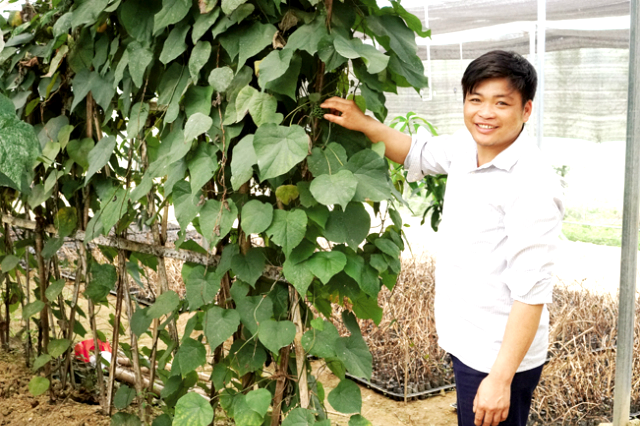 Society
Society


|
| Lý Tà Dèn introduces some herbal medicinal plants. — VNA/VNS Photo |
HÀ GIANG — Lý Tà Dèn is on a mission to carry out sustainable planting and collection of natural medicinal herbs for processing into products to serve visitors to Đồng Văn rocky plateau.
Dèn, a Dao ethnic man, lives in Nặm Đăm Village, Quản Bạ Commune, Quản Bạ District in the northern mountainous province of Hà Giang.
In 2014, Dèn and other people established the Nặm Đăm Cooperative to grow and process medicinal products, providing services like medicinal herbal baths, saunas, accommodation for tourists and tourism services.
At that time, the co-operative lacked capital and experience in harvesting and processing.
In 2015, most people asked Dèn to withdraw their capital from the co-operative, leaving only seven people involved and it seemed like the co-operative would have to dissolve, said Dèn.
But, with valuable medicinal herbs sources in nature and his desire to take advantage of the mountains and forests to improve the lives of people in upland areas, Dèn and the rest of the members kept the faith.
Production technology and finding output for the product was the first problem Dèn tackled.
The advantage of a co-operative is to have a local authority’s participation in connecting with pharmaceutical companies to perfect production technology and to consume the output.
To ensure the supply of medicinal herbs and preserve the precious medicinal herbs, in 2016, Nặm Đăm Cooperative worked with the Centre for Research and Development of Vietnamese Traditional Medicinal Plants to implement the project 'Preserving genetic resources of precious medicinal plants of the ethnic Dao people'.
The co-operative expanded the nursery area up to 3,000sq.m, keeping more than 100 species of valuable medicinal herbs such as cucumber, artichoke and honeysuckle.
The nursery ensures enough seed supply for the co-operative and local people and encourages members to develop medicinal plants in their own gardens based on their own techniques and sell them back to the co-operative.
Dèn said that when they had a stable source of raw materials, the co-operative would invest in building a drying area, a processing factory and a system of machinery for distilling essential herbal extracts.
The co-operative has built tobacco baths, a system of preliminary processing and pharmaceutical processing factories on an area of more than 4000sq.m with a total investment of some VNĐ2 billion (US$86,100).
After nearly six years of operation, the co-operative has created a brand name for the product and business activities are stable. The co-operative has invested in building relatively complete infrastructure systems, increasing revenue from production, preliminary processing of medicinal herbs, and most importantly, the co-operative's products have won the trust customers.
Each year, the co-operative develops from five to 10 hectares of medicinal plants, such as artichoke, ginseng, honeysuckle, rhubarb root, tuberose and some other plants in traditional remedies of the ethnic Dao people.
It processes more than 200 tonnes of raw materials, including 100 tonnes of raw materials from artichoke plantations and 100 tonnes of raw materials from natural medicinal herbs.
The cooperative creates jobs for 12 seasonal workers and 18 regular employees with an average income of about VNĐ4-5 million ($170-210) per person per month.
In addition, Dèn and the co-operative also develop a community-based cultural village in Nặm Đăm Village. After more than seven years of implementing the construction of a typical cultural and tourist village, the village has upgraded and repaired its old cultural house to welcome tourists.
Up to now, there is only one poor household in the village and many households have an average income of VNĐ50 million ($2,100) per person per year or more. The whole village has 19 households eligible to serve about 190 tourists per day. — VNS




